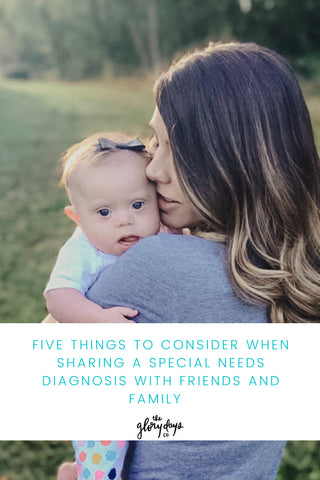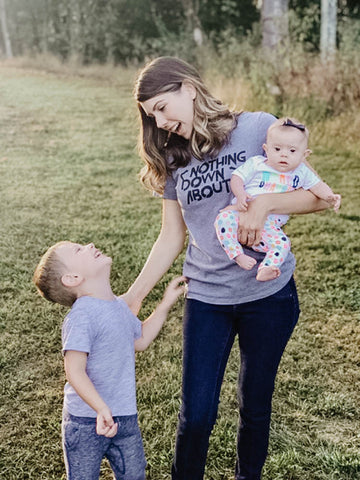How to Share a Special Needs Diagnosis with Friends and Family

Sharing the news with friends and family that our daughter was born with Down Syndrome was a task that filled me with anxiety. In the beginning, I just wasn’t ready to talk about it. I needed time to get my mind right and understand our new reality.
Looking back, I’m in some cases happy with how we shared this news, and in other instances, I wish I had gone about the process differently.
Following Rory’s birth, as family members came into the hospital to visit, I chose not to say anything. Whether because we didn’t have confirmed test results yet or because we were simply in shock and denial, both my husband and I opted not to mention it at all.
No matter the motivations, though, I still smile as I look back at those photos of our first few hours in the hospital with family and friends. I’m glad that they all had the opportunity to meet Aurora first—and not her extra chromosome.
If you’re currently navigating how to share your child’s special needs diagnosis with friends and family, here are a few things to consider before you begin sharing the news:

1. Do you feel emotionally ready for questions?
If not, keep this in mind when preparing to share the news. If you don’t want to talk, be open and share this in your communications or direct them to someone who can give the details you don’t have the ability to share at this time.
2. Set rules for yourself.
Personally, it was very important to me that the news of this diagnosis didn’t change how we celebrated our girl. To keep this value at the forefront, I had one important rule for myself: I’m not going to hide my daughter.
That boundary set early on helped me overcome fears as I decided when and whether to take public family outings and post photos on social media. If I was avoiding something out of a desire to hide Rory, I knew that I had to make a different choice.
What are some clear rules you can set for yourself so that you don’t fall into behavior you might look back and regret?
3. Do you have key people you feel should hear the news in person/first?
My parents, sibling, grandparents and closest girlfriends were on my list. I’m not going to lie this was hard. But, these intimate conversations were also life-giving. They will be in my heart for the entirety of my life. I was met with love and support. I didn’t start this train of face to face conversation until Rory was close to 8 days old and we were home. I was honest about my fears, what I needed from them and how I hoped they would love my daughter.
4. You don’t owe the world an explanation.
In the age of social media, public announcements are hard to avoid. In my case, I’d been blissfully sharing my pregnancy journey for 9 months with friends and family online. When Rory arrived with this extra news I had a ton of internal conflict regarding making a public statement about her diagnosis or not.
It gave me a lot of anxiety. It took me close to six months to finally put a name and statement to what we had been walking through. You don’t need to label your circumstances until you feel ready to do so. My “rules” came into play on this one. I wasn’t going to invite the general public into this personal moment until I could share our story in a positive light. How could I expect them to not feel pity for us if I was pitiful when telling them.
5. When developing your announcement think about how you wish you could have met your child or heard the news.
You will never get that moment back, but sharing your baby in the light you wish they would have been introduced to you is empowering. Remember, baby first, diagnosis second. Heck, send out a normal birth announcement, just them with no diagnosis attached to it. I was in a haze of shock and never sent one out for Aurora. I have regret over this now that we are out of those heavy days.
There is no right way to do this. You've got to put your emotions first, your family first and your little one first. The good life isn't over. There is joy in this journey.